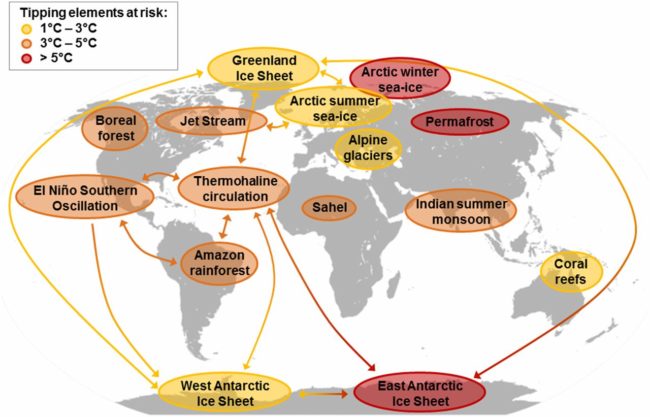
Most of us have enjoyed swings in childhood. Some have even tried to swing faster and make a full 360 degrees’ loop. Those who succeeded had a very strange feeling of not being able to predict whether, increasing the energy of the swing, the transition from normal oscillations and 360 loops would happen. Indeed, there is an energy threshold such that the swing goes from oscillations to full loops and the change in the behavior is abrupt. Say now that the swing is our planet and the energy pumped in the Earth system are the anthropogenic emissions, in a recently published paper in the Proceedings of the National Academy of Sciences (https://doi.org/10.1073/pnas.1810141115) Will Steffen and co-authors found that increasing the emissions would push the earth towards an abrupt change in trajectory, leading in a very short time span to a 5 degrees’ warmer climate.
Up to now, scientists have predicted a fast but smooth increase of the planet temperature with increasing anthropogenic emissions. Although catastrophic, this scenario would leave enough time to adapt our society to a warmer climate and the associated consequences such as sea-level rise. This study has however identified a series of interconnected factors which could cause a chain reaction and push the Earth towards a “hothouse” state. Deforestation, permafrost thawing, relative weakening of land and ocean physiological CO2 sinks can drive further warming – even if we stop emitting greenhouse gases. Like going through the full loop could cause injuries, this process is likely to be unstoppable and irreversible and will lead to devastating consequences. The authors say: “a Hothouse Earth trajectory will likely exceed the limits of adaptation and result in a substantial overall decrease in agricultural production, increased prices, and even more disparity between wealthy and poor countries”. A Hothouse Earth trajectory would almost certainly flood deltaic environments, increase the risk of damage from coastal storms, and eliminate coral reefs (and all of the benefits that they provide for societies) by the end of this century or earlier.
The results of this study have animated a debate in the climate change community and there is actually a substantial disagreement about the possibility of crossing the tipping point described in the article. The non-linear geophysics community is working hard to understand these critical phenomena in simple systems which represents idealized climate.
